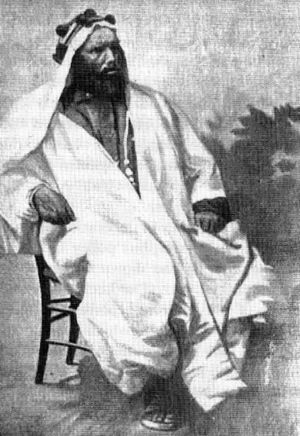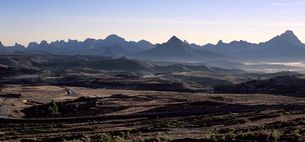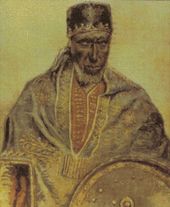راس علولة
| علولة إنگيدة (አሉላ እንግዳ) | |
|---|---|
 ألولة إنگيدة في 1887. | |
| وُلد | 1827 Mennawe, Tembien, إثيوپيا |
| توفى | 1897 |
| سنوات الخدمة | القرن 19 |
| الرتبة | جنرال |
| معارك/حروب | گوندت وگورا ودوگلي وعدوة والقلابات وكوفيت |
الراس شلاقة ألولة إنگيدة (گعز: ራስ አሉላ እንግዳ) (1827 – 1897؛ ويُعرف أيضاً بإسمه الفروسي أبا نگا وكذلك ألولة قوبي[1]) كان قائداً عسكرياً وسياسياً إثيوپياً. وكان واحداً من أبرز القادة للجيوش الإثيوپية في القرن التاسع عشر ويصفه المؤرخ الإسرائيلي حگاي إرليخ بأنه أعظم زعيم أنجبته الحبشة منذ وفاة الامبراطور توضروس الثاني في 1868،[2] ووصفه اوروپيون بأنه "گاريبالدي الحبشة".[3] وقد شارك في صد الحملة المصرية على الحبشة، كما شارك في العديد من معارك استقلال إثيوپيا، وأهمهم دوگلي وعدوة.
النشأة
وُلِد ألولة في قرية مِنـّاوة في مقاطعة تمبيان، على بعد 24 كم جنوب أبي أدي، ابناً لـ "إنگدا إقوبى"، المزارع البسيط. وثمة قصة عن طفولة ألولة -- "well known throughout Tigray": a group of people carrying baskets of bread to a wedding ceremony were stopped by a group of children led by the future Ras, who demanded to know where they were going. "To the Castle of Ras Alula Wadi Qubi," they mockingly replied. "Thereafter," concludes Erlich, "his friends and the people of Mannawe nicknamed him Ras Alula."[4]
At first Alula attached himself to the distinguished Ras Araya Dimtsu, hereditary chief of Enderta who was lord of the land his father farmed; before long he gained the attention of Ras Araya's successful nephew, Dejazmach Kassa Mercha (the future emperor Yohannes IV), who made him his elfegn kalkay ("chamberlain and doorkeeper"). Erlich records an oral tradition that the young Alula distinguished himself by being the one who captured Tekle Giyorgis in the battle where Emperor Yohannes crushed his opponent (11 July 1871).[5] In spite of his humble backgrounds, Alulua succeeded in climbing the ladder of the feudal hierarchy.
He had three children by his first wife Wozero B'tweta. However in order to enhance his position at the Imperial court, he divorced his wife and married Woizero Amlesu Araya, daughter of Ras Araya Dimtsu, the powerful and much respected uncle of Emperor Yohannes IV. His second marriage was purely for political reasons, to improve his legitimacy with the local aristocracy, who did not hide their disapproval at seeing the son of a peasant reach this stature.
وقد أظهر ألولة مهاراته العسكرية في معركتي گوندت وگورا، اللتين نشبتا في نوفمبر 1875 ومارس 1876 بالترتيب، حيث هزم القوات المصرية. Emperor Yohannes badly needed a man with these skills at the moment, for Ras Wolde Mikael was in revolt in Hamasien; Alula was promoted to Ras and sent to deal with this unruly aristocrat, who fled to Bogos. On 9 October 1876, the Emperor Yohannes IV made Alula governor of Mereb Mellash and Midri Bahri (today part of Eritrea).[6] That same year the new Ras moved his family and following to Asmara, where he built a palace at the top of a hill in the middle of that town. From Asmara, he devoted himself to defending the northern borders of Ethiopia against the Italians, the Anglo-Egyptian forces, and later the Mahdists.
معركة كوفيت
في معاهدة هيوِت، المبرمة في 1884، اعترفت المملكة المتحدة بكلٍ من بوگوس ومصوع كممتلكات لإثيوپيا مقابل مساعدة الراس ألولة في إخلاء الحاميات المصرية من Amedeb, Algeden, Keren, Ghirra, and Gallabat which had been isolated by the Mahdists, and because of these successes the British once more asked for his help against the Mahdists under Osman Digna.[7]
Ras Alula prepared for his campaign against the Mahdists, despite the opposition of certain local leaders who did not accept his rule. Nevertheless Alula advanced into the territory of the Bogos, then entered Keren in September 1885, where he stayed for ten days, then marched on Kufit.
في كوفيت، Osman Digna's forces were annihilated, but the Ethiopians also suffered significant losses: the commanders Blatta Gebru and Aselafi Hagos were killed, and Ras Alula himself was wounded.
معركة دوگلي
However events beyond Tigray or the Horn of Africa gave Ras Alula very little time to recover from the battle. As part the European الهروع إلى أفريقيا, at this time the Italians took control of the سواحل البحر الأحمر، occupying Massawa and Sahatit with the tacit approval of the British, which was a violation of the Hewett Treaty.[بحاجة لمصدر]
Although he had collaborated with the British against the Mahdists, Ras Alula chief interest was to guarantee Ethiopian sovereignty, which made him very wary towards the English whom he suspected supported the Italians' encroachments. His mistrust is clearly expressed in a conversation carried out with Augustus B. Wylde, the former British vice consul at Jeddah, who recorded these words in a dispatch to the Manchester Guardian:
What does England mean by destroying Hewett's treaty and allowing the Italians to take my country from me? …Did I not relieve the Egyptian garrison in the Bogos country? Did I not fight at Cassala when it was too late? Have I not done everything I could? You English used us to do what you wanted and then left us.[8]
Upon returning to Asmara, Alula mobilized 5,000 men and marched from Ghinda towards Sahati. It is unclear whether Ras Alula was acting on his own initiative in this instance, or at the orders of his Emperor. Discussing the battle later, he insisted that he was following orders; contemporary Ethiopian documents support Ras Alula's claim. However in a 9 March 1887 letter to Queen Victoria, Emperor Yohannes wrote that his general had first spent two weeks investigating the Italian presence, then demanded that the Italians either evacuate their positions outside of Massawa or fight.[9]
Before attacking the Italians, he notified Emperor Yohannes of his intentions, which is expressed to Harrison, who had accompanied the admiral Hewett during the negotiations of the treaty, declaring to him that the British had not honored their word.
ألقى ألولة القبض على إيطاليين شك أنهم جواسيس، ووضعهم في العمل على بناء جسر على النيل للنگوس تكلى هيمنوت من گوجام.
To Marcopolo Bey Ras Alula wrote that the Italians were in Massawa, and to the Consul Sumagn de France, he warned that he would destroy the Italian forces if they did not leave Abassinian territory. But the Italians believed that it was "the divine will that the Italians come to Massawa". In October 1886, the forces of Alula appeared near Sahati and Massawa.
By December 1886, confrontation with the Italians was inevitable. The first clash took place 25 January 1887 at Sahati, where the Ethiopians were repulsed with heavy casualties; Alula rallied his troops and the next day annihilated the Italian relief column at Dogali. The commander of the Italian forces, colonel Tommaso De Cristofori was killed in this battle, along with 400 soldiers and 22 officers.
معركة القلابات
By 1888 the Sudanese Italians and dervishes were ready to renew their attacks. In March 1889, the معركة القلابات (also known as the Battle of Metemma) was fought on the western Ethiopian border. Here the Emperor Yohannes was wounded and killed, and his head taken by the Mahdists as a trophy, in spite that the Ethiopians almost carry the day. Emperor Yohannes' death led to a period of political turmoil in Ethiopia. Although Yohannes on his deathbed had named his son Ras Mengesha as his heir, and begged Ras Alula and his other nobles to support him, within a matter of weeks Menelik II was recognized throughout Ethiopia as the new emperor.[10] Meanwhile Ras Alula found himself isolated, his patron dead, and the steady Italian advance from the coast having deprived him of his power base beyond the Mareb River.
Menelik II of Shewa was crowned emperor only a few months after the battle. The Italian Count Pietro Antonelli, who represented his country in Ethiopia, hastened to Wuchale where he negotiated a treaty with Menelik, which gave official Ethiopia recognition to Italian possession of all of the land the Italians occupied. A few months later, they used this treaty to declare Eritrea their African colony.
معركة عدوة

إثر معاهدة ووتشاله، واصل الإيطاليون التوسع غرباً، ليس فقط حول تسني وأگوردات، بل أيضاً حول عدوة. Unknown to Emperor Menelik, the Italian version of the treaty had language making Ethiopia a protectorate of Italy, and the Italian actions were in preparation for its enforcement on his empire and making it a colony. When Emperor Menelik learned of this treachery, he renounced the treaty which led to the First Italo-Abyssinian War, and as the bitter news spreads through Ethiopia the major nobility and military figures, including Ras Alula, unanimously joined him. The conflict has its climax at the Battle of Adwa on 1 March 1896.
In this battle, Alula was on the left side of the Ethiopian positions, on the heights of Adi Abune, supported by Ras Makonnen, and Ras Mikael. The forces of Ras Sebhat and Dejazmach Hagos Tafari likewise joined Ras Alula and Ras Mengesha.
Augustus Wylde, a contemporary of the events, described Ras Alula's invaluable contribution to this critical battle:
The Abysssinians never expected to be attacked, and the Italian advance would have been a complete surprise, had it not been for Ras Aloula, who never believed the Italian officials, and would never trust them. Two of his spies observed the Italians leave Entiscio, and arrived by a circuitous route, and informed Ras Aloula, who was one mile to the north of Adi-Aboona, that the enemy was on the march to Adowa. The Ras immediately informed King Menelik and the other leaders, and the Abyssinians prepared for battle, sending out strong scouting parties in all directions in front of their positions towards Entiscio.[11]
وأثناء المعركة، Ras Alula was assigned to watch the Gasgorie Pass and block the arrival of Italian reinforcements coming from Adi Quala.[12]
وفاته
لم يتمكن الراس ألولة من أخذ قسط من الراحة بعد ذلك النصر؛ فبعد أقل من عام، في 15 يناير 1897، خاض معركة ضد غريمه القديم، الراس هاگوس من تمبين. وبالرغم من انتصار الراس ألولة ومقتل الراس هاگوس، فإن الراس ألولة قد أصيب بطلق ناي في ساقه، وتوفي متأثراً بجراحه في 15 فبراير 1897.[13]
تذكارات لألولة
- المطار في مقئلة مسمى على اسم الراس ألولة، وثمة تمثال على صهوة جواد مقام له في تلك المدينة.
- فندق في أكسوم يحمل اسمه.
- Ethiopian scholar Richard Pankhurst سمّى ابنه الدكتور ألولة پانكهرست، على اسم الراس.
- Zewdu Belete named his son, Alula zewdu, على اسم "الراس".
الهامش
- ^ Shinn, p. 25
- ^ From the back cover of Haggai Erlich's biography, Haggai Erlich, Ras Alula and the Scramble for Africa: A Political Biography: Ethiopia & Eritrea 1875-1897 (Lawrenceville: Red Sea Press, 1996) ISBN 1-56902-029-9
- ^ Augustus B. Wylde, Modern Abyssinia (London: Methuen, 1901), p. 29
- ^ Haggai Erlich, Ras Alula and the Scramble for Africa: A Political Biography: Ethiopia & Eritrea 1875-1897 (Lawrenceville: Red Sea Press, 1996), p. 5 Erlich states the year of his birth as 1847.
- ^ Erlich, Ras Alula, p. 9
- ^ Erlich, Ras Alula, p. 13
- ^ Wylde, Modern Abyssinia, pp. 35ff
- ^ "An unofficial mission to Abyssinia", Manchester Guardian, 17 May 1897; quoted in Erlich, Ras Alula, p. 74
- ^ Erlich, Ras Alula, pp. 105f
- ^ Paul B. Henze, Layers of Time, A History of Ethiopia (New York: Palgrave, 2000), p. 162 ISBN 0-312-22719-1
- ^ Wylde, Modern Abyssinia, p. 204
- ^ Wylde, Modern Abyssinia, pp. 209f
- ^ Erlich, Ras Alula, p. 196
للاستزادة
- Shinn, David Hamilton, Ofcansky, Thomas P., and Prouty, Chris (2004). Historical dictionary of Ethiopia. Lanham, Maryland: Scarecrow Press. p. 633. ISBN 0-8108-4910-0.
{{cite book}}: CS1 maint: multiple names: authors list (link) - "Ras Alula, the Abyssinian" 12 April 1887 New York Times article
- "Ras Alula dead, An Abyssinian General of Great Ability -- The Son of Peasants" 27 February 1897 New York Times article
وصلات خارجية
- Ras Alula Abba Nega: An Ethiopian and African Hero by Ghelawdewos Araia


